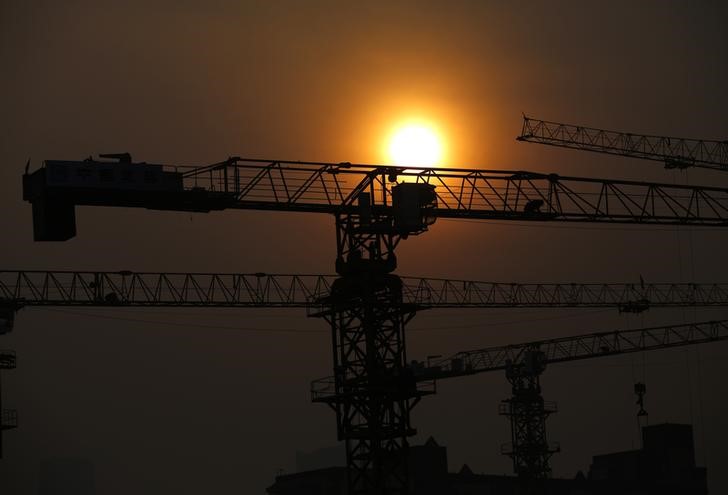By Kevin Yao
BEIJING (Reuters) - China is likely to post its weakest growth since the global financial crisis in the fourth quarter as its property market cooled, reinforcing expectations the government will have to roll out more stimulus measures to avoid a sharper slowdown.
Data on Tuesday is expected to show the world's second-largest economy grew 7.2 percent in the October-December quarter from a year earlier, slowing from 7.3 percent in the previous quarter, a Reuters poll showed.
That would be its weakest performance since the first quarter of 2009, when the growth rate tumbled to 6.6 percent and a sudden collapse in world trade threw some 20 million Chinese out of work.
Full-year economic growth in 2014 is almost certain to undershoot the government's target of 7.5 percent and mark the weakest expansion in 24 years, adding to concerns about shaky global demand.
With the property market likely to remain under pressure and investment sluggish, many market watchers expect Beijing to cut its growth target for 2015 to around 7 percent.
Some analysts say even that may be a stretch, and more stimulus measures are widely expected, especially as the economy faces persistent deflationary pressure - evident by falling factory prices that have eroded corporate earnings.
The central bank, which cut interest rates in November for the first time in more than two years, is expected to cut rates again or lower reserve requirement ratios (RRR) for all banks, or both, although it may be worried that faster policy loosening could lead to speculation in financial and property markets.
"We expect monetary policy loosening in 2015, with 50 basis points cuts in interest rates and 100 bps cuts in RRR," said Zhu Jianfang, chief economist at CITIC Securities in Beijing.
Analysts at PRC Macro Advisors said in a research note that they expected the central bank to cut RRR by 50 basis points before the Lunar New Year holiday, which begins on Feb. 19.
SLOWDOWN SEEN IN 2015
China's economy is predicted to grow 7 percent in 2015, and slow further to 6.8 percent next year, according to a Reuters poll, which also showed economists expected the central bank to cut RRR in the first half.
China's reform-minded leaders have shown a greater tolerance for somewhat slower growth, taking comfort from resilient employment thanks to a robust services sector. But economists worry that clumsy attempts to force the transition from manufacturing could do more harm than good.
Beijing has ruled out massive stimulus as China is still struggling to deal with a mountain of local government debt which resulted from 4 trillion yuan (426 billion pounds) in spending rolled out in 2008/09 to counter the global crisis.
The National Bureau of Statistics will also release some December activity data on Tuesday, which could give offer some clues on how much economic momentum will be carried into 2015.
Factory output is forecast to rise 7.4 percent in December from a year earlier, quickening from November's 7.2 percent. Retail sales, a gauge of consumption, likely grew 11.7 percent, steady from November.

Fixed asset investment, a key driver of the economy, likely grew 15.8 percent in all of 2014, matching the pace in the first 11 months of the year, which hovered near a 13-year low.